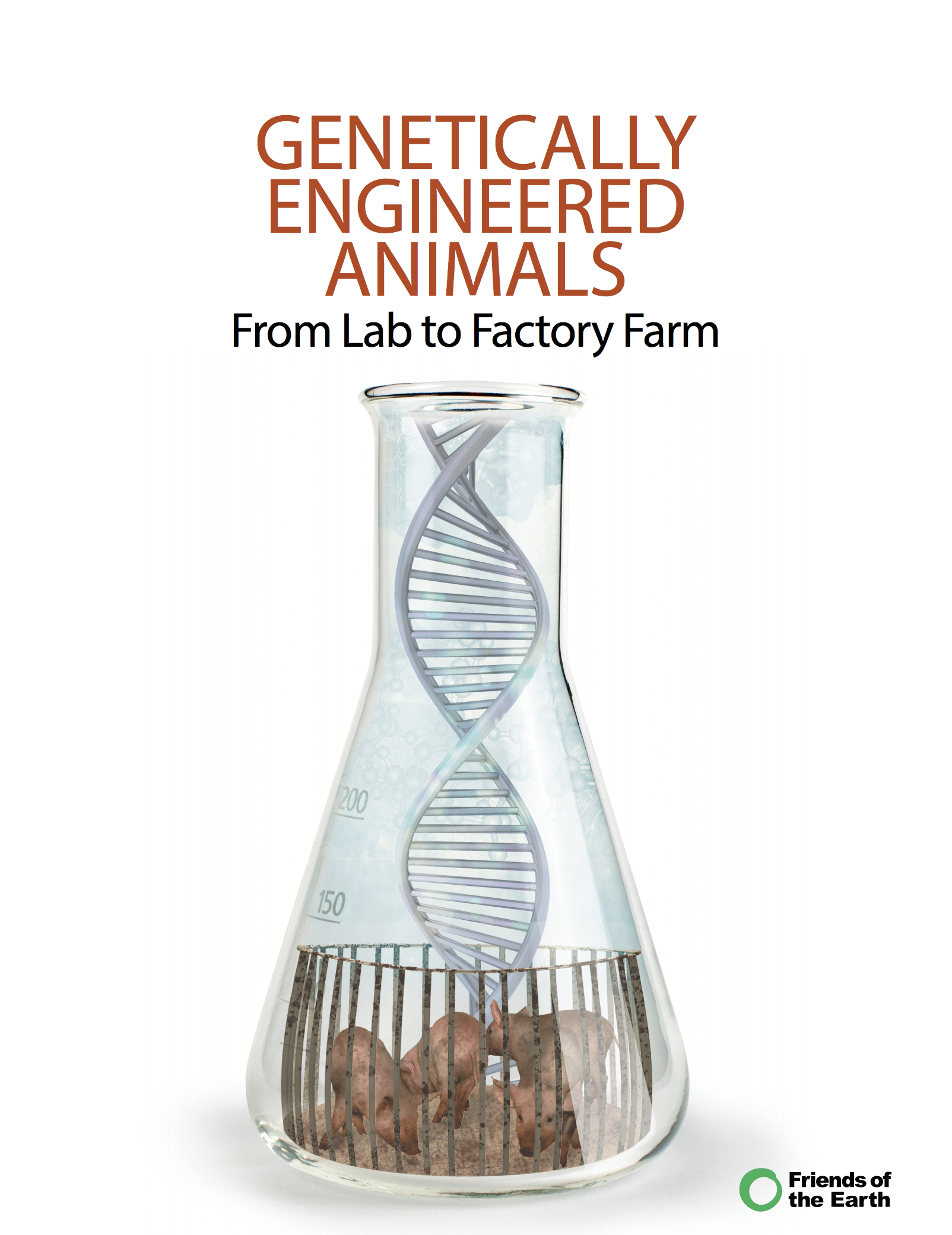Genetically Engineered Animals: From Lab to Factory Farm

This report, provides a scientific overview of the concerns with genetically engineered food animal experiments that are underway, and reveals the risks to human health, the environment and animal welfare. It sheds light on the unintended consequences of genetic engineering techniques known as gene editing, and considers the implications for U.S. regulations. The report also highlights the gaps in what scientists know about the effects of editing DNA to confer certain desirable traits.
The report summarizes peer-reviewed research on genetically engineered animals in development, including super-muscly pigs, hornless cows and disease resistant chickens and pigs. Studies show that, far from being “precise,” gene editing can cause genetic errors, even if only a genetic “tweak” is intended. Genetic errors can lead to unexpected effects in gene-edited animals, such as enlarged tongues in rabbits and extra vertebrae in pigs. Studies also suggest that common gene editing traits, such as hornless cows and disease resistance, will perpetuate the poor animal management, such as crowding, often found in animal factory farming. Rather than creating genetically engineered animals to fit into factory farming systems, the report recommends it is critical to develop sustainable and ecological animal agriculture systems that support preservation and restoration of biodiversity, public health and animal welfare.
The report was co-authored by Dana Perls, senior food and technology campaigner, Friends of the Earth and Dr. Janet Cotter, Logos Environmental.
Press release
Full report
Executive summary
Op-ed
Key Findings
- Studies show that, far from being “precise,” gene editing can cause genetic errors, even if only a genetic “tweak” is intended. Genes can be changed at additional locations and gene editing can interfere with gene regulation.
- Common gene editing traits, such as hornless cows and disease resistance, will perpetuate the poor animal management, such as crowding, often found in Concentrated Animal Feeding Operations (CAFOs). This will magnify the current ethical, health and welfare concerns for animals housed in CAFOs.
- Genetic engineering of animals often involves cloning, which leads to birth defects, spontaneous abortions and early postnatal death. Genetic errors can lead to unexpected effects in gene-edited animals, such as enlarged tongues in rabbits and extra vertebrae in pigs. These raise concerns for animal health, welfare and consumer safety.
- Unexpected effects include the production of abnormal proteins in gene-edited animals. Allergens are proteins, so abnormal proteins could create new food allergies and have significant implications for food safety.
- There are significant gaps in research about how genetic errors at the cellular level manifest as unexpected effects and how these unexpected effects may impact the animal’s health, interact with complex environmental factors and affect food safety.
- Although still at the hypothetical stage, gene drive systems could drive a specific trait through a herd or population of farm animals and could accidentally spread to the natural population, potentially affecting biodiversity and even an entire ecosystem.
Recommendations
- Rather than creating genetically engineered animals to fit into factory farming systems, it is critical to develop sustainable and ecological animal agriculture systems that support animal welfare, preservation and restoration of biodiversity and public health.
- All genetic engineering techniques should fall within the scope of government regulatory oversight of genetic engineering, including gene editing, using the Precautionary Principle to protect human health and the environment.
- Oversight and regulations for GMOs, including gene-edited animals, should include independent assessment for environmental and food safety and long-term impacts before entering the market or environment. Products of all genetic engineering should be traceable and clearly labeled as GMOs.
Ways to Support Our Work

Read Latest News
Stay informed and inspired. Read our latest press releases to see how we’re making a difference for the planet.

See Our Impact
See the real wins your support made possible. Read about the campaign wins we’ve fought for and won together.

Donate Today
Help power change. It takes support from environmental champions like you to build a more healthy and just world.